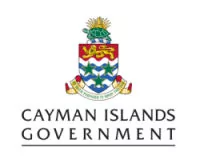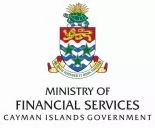Government, regulators and the Cayman Islands private sector recently came together to better identify the risks of misusing legal persons and arrangements – such as companies, partnerships and trusts – as Cayman strengthens our fight against money laundering, terrorist financing and the financing of weapons of mass destruction.
About 150 persons attended the Friday, 8 November event, hosted by the Cayman Islands Monetary Authority (CIMA) and the Anti-Money Laundering Unit. Five presenters explained the various risks in which Cayman could be misused for financial crime to the audience of lawyers, accountants, realtors, financial institutions, and trust and corporate services providers.
"It's important that as a jurisdiction, we consistently improve our knowledge and understanding of our risks," said Ms Elisabeth Lees, National Coordinator for Cayman's Anti-Money Laundering Steering Group (AMLSG).
By increasing the knowledge of our risks, Cayman is meeting recommended actions made by the Caribbean Financial Action Task Force in its Mutual Evaluation Report of the Cayman Islands, published in March 2019. Cayman has until February 2020 to make positive and tangible progress toward the recommended actions.
Gabriele Dunker, Executive Director of Financial Transparency Advisors, an international consultancy that is supporting the Cayman Islands with responding to the recommended actions, noted the strong turnout for the event.
"The CFATF recommended actions can be quite abstract at times, and FTA is helping the Cayman Islands turn the recommended actions into tangible outcomes," she said.
The presenters used typologies – or, case studies – to demonstrate the practical application of Cayman's legal framework for AML/CFT/CPF (anti-money laundering; countering the financing of terrorism; and countering proliferation financing, which also is known as weapons of mass destruction).
Ms Dunker discussed how Cayman domiciled legal persons have been used to commit financial crime, while Ms Lees explained how a legal person could become subject to criminal prosecution. Mr Robert (RJ) Berry, Director of the Financial Reporting Authority, spoke about the role of the anti-money laundering reporting officer.
Drawing on local case studies, Ms Angelina Partridge, CIMA's Acting Deputy General Counsel, provided a regulatory perspective on the misuse of legal persons; while Mr Andy Spilsbury from Tribridge Compliance Partners demonstrated how professional money launderers actively sought to evade customer due diligence requirements in several jurisdictions around the world, including the Cayman Islands.
Ms Lees said that increasing the private sector's understanding of risks will strengthen our AML/CFT/CPF regime, deter and prevent criminals from abusing Cayman, and improve our local and international reputation.

Robert (RJ) Berry, Director of the Financial Reporting Authority (right), answers an audience member's question during an 8 November event, held to strengthen the Cayman Islands' fight against money laundering, terrorist financing and the financing of weapons of mass destruction. Panellists (L-R) are Gabriele Dunker, Executive Director of Financial Transparency Advisors; Lisa Maria Poelzer, an Austrian Federal Ministry of Finance lawyer who assisted Ms Dunker; Elisabeth Lees, National Coordinator for Cayman's Anti-Money Laundering Steering Group; and Mr Andy Spilsbury, from Tribridge Compliance Partners.
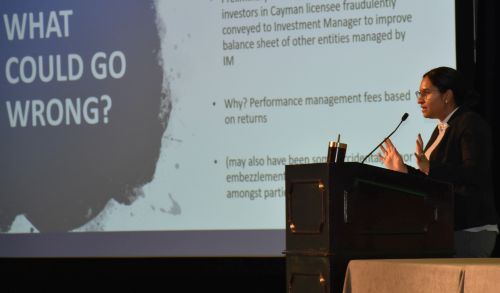
Angelina Partridge, the Cayman Islands Monetary Authority's Acting Deputy General Counsel, provided a regulatory perspective on the misuse of legal persons at the 8 November 2019 event.
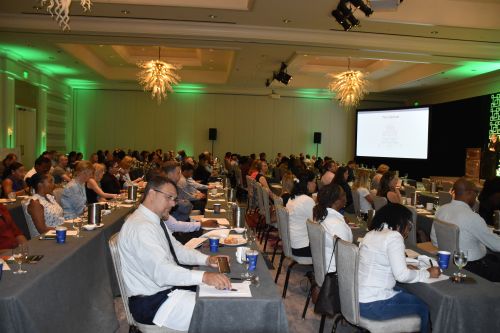
About 150 persons attended the 8 November 2019 event.
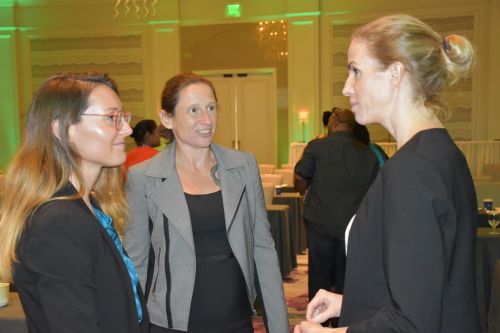
(From left) Lisa Maria Poelzer, an Austrian Federal Ministry of Finance lawyer who assisted Ms Gabriele Dunker, Executive Director of Financial Transparency Advisors with Cayman's 8 November event; Justine Plenkiewicz, Deputy National Coordinator, Cayman's Anti-Money Laundering Steering Group; and Ms Dunker speak after the event.
The content of this article is intended to provide a general guide to the subject matter. Specialist advice should be sought about your specific circumstances.
